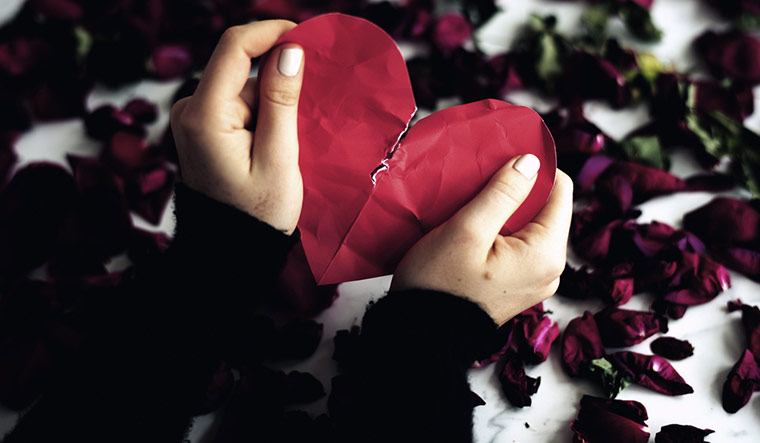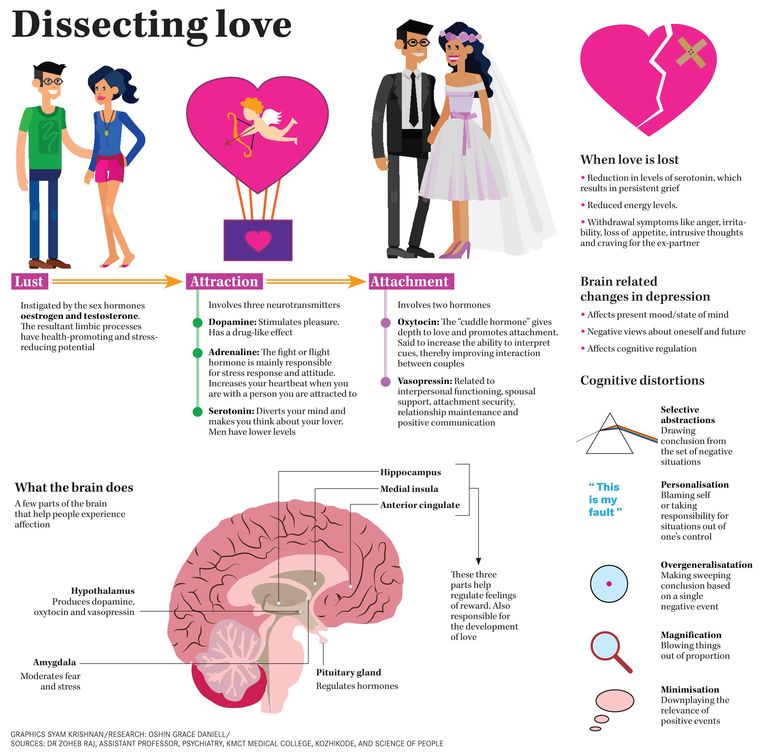It starts with a whimper and ends with a wail. In between, the mobile phone crashes onto the floor, shattering the display. Sarah, 25, is into her second break-up, and there she is on the floor, crawled up in foetal position, her body shuddering every now and then, releasing her distress. Her's is not just another break-up story where the tears wash away the pain. She had been having regular panic attacks, and it reached a point where she lost confidence to even talk to another person. Her parents did not take it seriously until she dropped 10kg in a span of two months. They initially blamed it on her poor appetite and sleeping pattern. Little did they know the problems were psychosomatic. At the psychiatrist's she was identified as having “clinical depression”.
Can lost love do so much damage? It does, but rarely do people seek medical help for it. Most people tend to call it grief and let it pass. But, there is a difference between grief and depression.
Says Dr Zoheb Raj, assistant professor of psychiatry, KMCT medical college in Kozhikode: “Grief is a very normal reaction to the loss of someone or something. It usually comes with adjustment disorders. Normal grieving is anywhere around three to six months. Most people tend to be socially withdrawn during this phase and it can also impair daily activities. But once it starts affecting your way of thinking, cognition and completely disrupts your functioning―it is termed depression.”
According to him, persistent low mood for over two weeks is one of the characteristics of this condition. Then there is 'anhedonia', the inability to feel pleasure in normally pleasurable activities. “What happens in clinical depression is you lose interest in doing things that normally make you happy. It may be listening to music or watching a movie. With this comes 'anergia'―easy fatigability or abnormal lack of energy. People who are depressed tend to get worn out soon while doing their daily activities. This reduces their efficiency at work,” says Zoheb.
With the aforementioned being the core symptoms of depression, there are other associated signs like persistent feeling of hopelessness, low self-esteem and guilt. “Among the three, guilt is very difficult to tackle. Guilt can result in fleeting suicidal thoughts, which can be very dangerous,” says Zoheb.
According to Dr Elsie Oommen, consultant psychiatrist at the Medical Trust Hospital in Ernakulam, the seriousness of the relationship determines the intensity at which depression can hit a person. “The more the emotional and physical attachment, the more the chances of being in depression or extended period of grieving,” she says.
The feeling of loss triggers stress hormones. “Whenever there is stress, certain neurotransmitters are released,” she says. “As a result, our body tends to react, which brings about certain physiological reactions like increased heartbeat, fainting spell, breathlessness, light-headedness, bloating sensation of abdomen, muscle twitching and tightening, migraine, nausea, insomnia and other changes in the endocrine parameters. Apart from these, there are other psychological, emotional and physical reactions.”
“You’ll heal. You’ll move on. It’s for the best. You deserve much better.”
If you have ever been through a breakup, you'll agree that such words are hardly consolatory. When memories of all the good times you shared with your ex comes crashing over you, reconciliation seem like the only possible source of joy. As you finish your third tub of ice-cream in an attempt to fill up the “ex-shaped void” inside, you must have cried out in frustration: “Why does it hurt so much?" Your tear-soaked pillow might not provide an answer, but science will.
Evolution has wired your brain to treasure and preserve emotional connections. It would have certainly helped the survival rate of your prehistoric ancestors to have had won the favour of a few friends. But even today, loneliness can kill and your brain perceives breakups as nothing short of threats to your very survival. And, that is why when your relationship ends, your brain freaks out. The big red button is pressed and panic mode kicks in. The brain fixates on the “threat”, scowls at you for causing it in the first place, and urges that it gets fixed.
But can you really blame your brain? It was having a good time, gulping down the cocktails of serotonin and dopamine that love kept serving. Suddenly, all the positive stimulants that the brain had grown to expect are removed and it reacts. Love certainly is a drug and absence results in withdrawal symptoms like with any other drug and you find yourself caught in an unforgiving flurry of emotions. Unbearable sadness slaps you across the face, anger punches you in the gut, guilt pokes you in the eye and vengeance throws in a kick for good measure.
You are now vulnerable, facing an uncertain future. Old insecurities and fears make a comeback with trumpets blaring. Your days that had structured themselves around your relationship now feel empty, you feel like you have lost a part of yourself. Everything has changed and everything under the sun callously reminds you of the change. However, all these gut-wrenching feelings are natural. They are biological, merely your brain chemistry reacting to loss and pain. But a friend attempting to explain biochemistry to a mourning you will probably get a shoe thrown at him or her. Yet, the fact remains that you do need your friends, even the chemical formula spouting ones.
As your brain continues to beat you up, a fair outlook on the relationship would be too much to demand from yourself. A sea of hostile emotions would have already wrecked your logical self and navigating through these emotions alone is too big a challenge for anyone. Each relationship is different and people cope in different ways, but it is important to realise that you need not be alone. Let your friends and family remind you of the full life that awaits you.
But if the impact does get to be too overwhelming for you, affecting your daily life and other relationships, there is absolute sense in seeking professional help. You have just gone through a major upheaval and you might need a bit of help in realigning yourself. “Visiting a psychiatrist has been stigmatised by Indians. Having said that, it also depends on the background of the particular person. The new generation adults tend to seek medical help when it comes to these matters. But, it is not as simple as visiting a physician,” says Elsie. According to Zoheb, people who are sensitised to the benefits of psychotherapy tend to go for it. “Medical students and people who are closely associated with the medical sector are quick to get it fixed,” he says.
“Post breakup gloom is not to be taken lightly,” says Dr Varghese Punnoose, professor, psychiatry, Government Medical College, Alappuzha, as he cites aloofness, academic decline and aggression as possible after effects. Employing unhealthy coping mechanisms at this stage would lead one through a downward spiral resulting in persistent emotional baggage and even thoughts of self-harm.
High levels of professional competence and expertise is needed to take on such a precarious state of mind. “Stay away from self-proclaimed counsellors,” says Dr Punnoose. Trained professionals can tackle the emotional storm better. Therapy and other such legit avenues have proven to be of much aid in seeing emotions to their completion.
According to Elsie, intrusive thoughts post break-up is almost uncontrollable. “Music, images or places that remind a person of their lover tend to bring a string of obsessional thoughts. Studies have shown that the area of the brain that is activated during this time is the same that is activated during a physical pain. It can be a very traumatic experience which can lead to further negative thoughts,” she says.
Healing a broken heart is like healing a physical injury―it requires care and time. Go easy on yourself, seek help, calm your frenzied brain and don't be afraid to start again. Soon enough, you will be able to sift through the relics of your past relationship and find revealing lessons about yourself. At that point you would have not only recovered from the heartbreak but also be a better person because of it.





